Do you find yourself constantly fending off your cat’s curious paws as you reach for the fridge door?
We all want to share our favorite foods with our furry companions, but it can be challenging to know what’s safe and healthy for them. After all, cats have their own unique preferences when it comes to food.
Luckily, we’ve done the research for you and consulted with veterinarians to compile a list of the best fridge foods that your cat can safely enjoy. From surprising options to traditional favorites, there’s a variety of choices that will satisfy even the pickiest eaters.
However, it’s important to note that some of these foods should only be given as an occasional treat to prevent any potential health problems. As loving owners, we want to make sure our cats are provided with nutritious options that keep them happy and healthy.
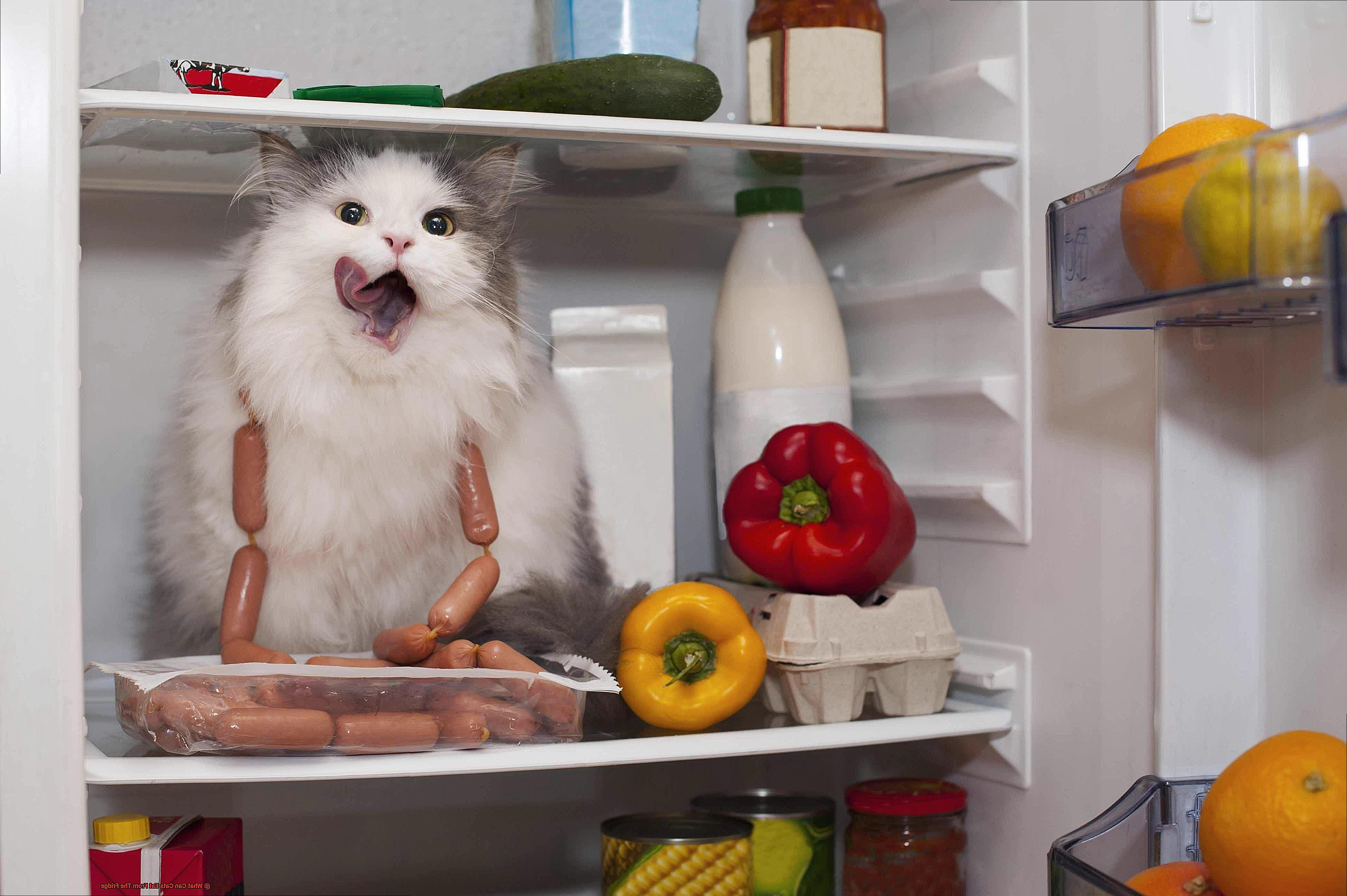
We’ll guide you through the diverse range of foods that your cat will love.
Cats as Obligate Carnivores
Unlike humans and other omnivorous animals, cats cannot produce certain essential nutrients from plant-based sources.
Therefore, a diet rich in meat, poultry, and fish is essential to meet their nutritional needs. Cats have a unique digestive system that is designed to break down and absorb nutrients from animal-based proteins.
They require high levels of protein, amino acids, and fat to maintain their health and well-being. Without these vital nutrients, cats can suffer from muscle wasting, skin and coat problems, and even organ failure.
However, not all animal-based proteins are created equal. Cats need high-quality proteins that contain all the essential amino acids that they need to maintain their muscle mass and support their immune system.
Meat, poultry, and fish are excellent sources of these proteins. While it may be tempting to offer your cat scraps from the fridge or table, it’s important to be aware that many human foods are not suitable for cats and can even be harmful.
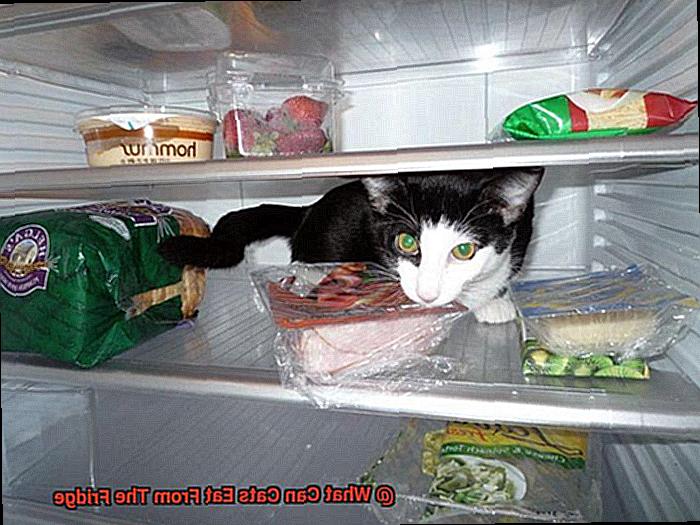
Foods such as chocolate, onions, garlic, and grapes can be toxic to cats and should never be fed to them. When it comes to dairy products, many cats are lactose intolerant and may experience vomiting or diarrhea after consuming milk.
However, small amounts of plain yogurt or cheese can be a safe alternative for some cats. Vegetables and fruits can also be a nutritious addition to your cat’s diet.
Leafy greens like spinach and kale are high in vitamins and minerals that are beneficial to cats. Additionally, spinach and green beans are a good source of fiber and nutrients that can support digestion.
In conclusion, providing your cat with a balanced and nutritious diet is essential for their health and well-being. As obligate carnivores, cats require high-quality animal-based proteins in their diet to meet their nutritional needs.
By feeding them meat, poultry, and fish alongside small amounts of safe dairy products and fruits, you can ensure your feline friend receives the right nutrition they need to live a happy life.

Meat and Fish Options from the Fridge
Meat and fish options from the fridge are a great way to provide your cat with the essential proteins they need to stay healthy.
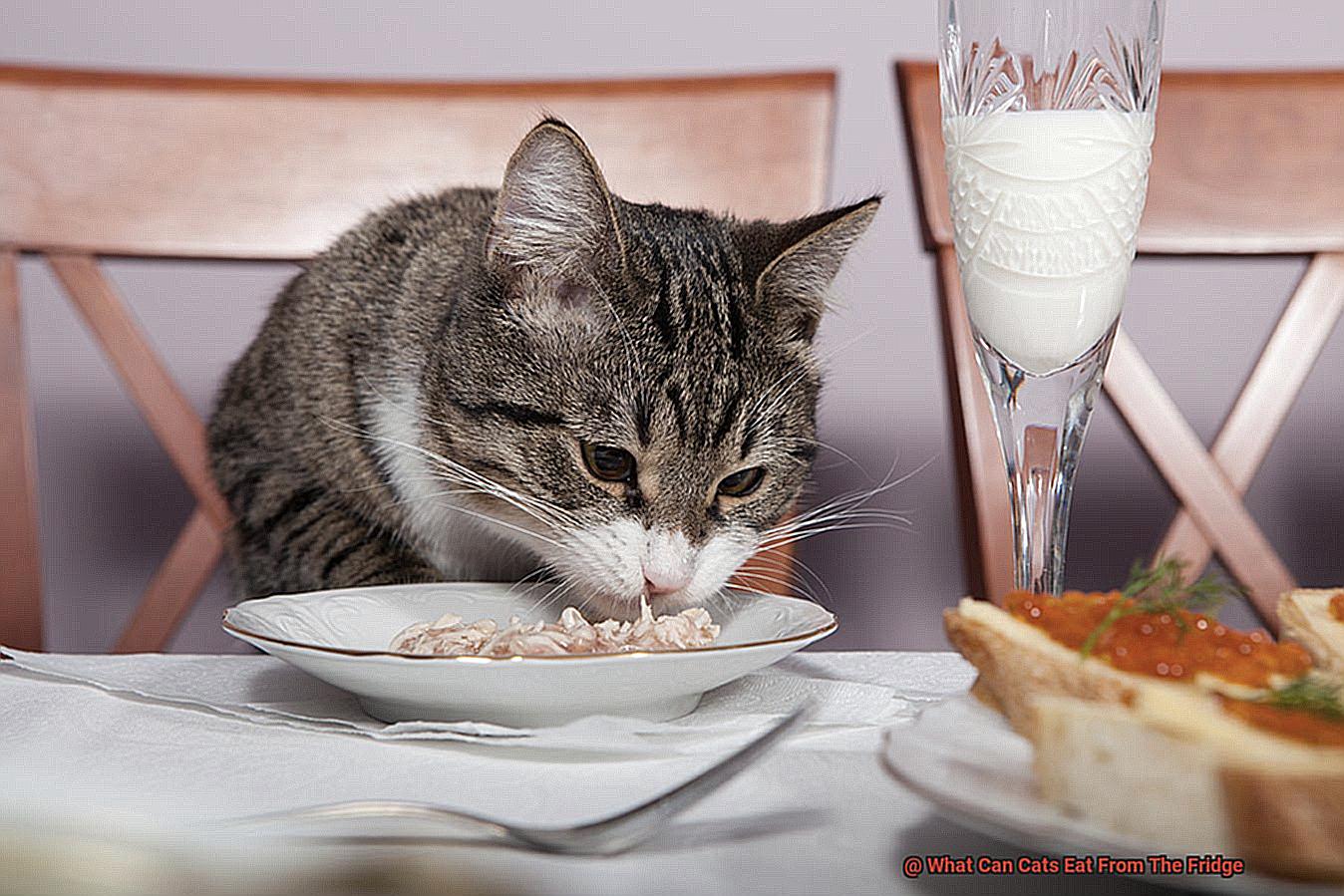
However, as a feline nutrition expert, I know that not all types of meat and fish are safe for cats to eat. Firstly, it’s crucial to avoid giving your cat raw or undercooked meat as this can lead to food poisoning and other health issues.
Instead, make sure to cook the meat thoroughly before offering it to your feline friend. When it comes to selecting meat options, lean meats such as chicken and turkey are an excellent choice for cats.
These meats are high in protein and low in fat, which can help keep your cat healthy and lean. On the other hand, processed meats like sausages and deli meats should be avoided at all costs as they often contain preservatives and additives that can be harmful to cats.
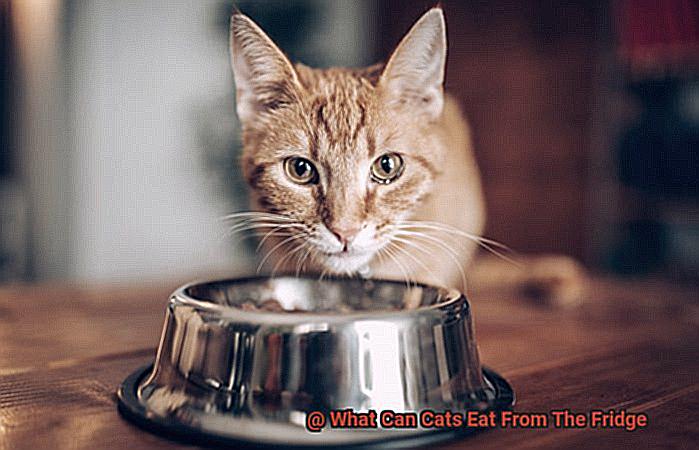
Fish is also a popular option for cats, but you must choose the right kind. Salmon and tuna are both excellent sources of protein and omega-3 fatty acids that help maintain healthy skin and a shiny coat.
However, it’s crucial to limit the amount of fish you give your cat as too much of it can lead to thiamine deficiency, which can cause neurological issues. In conclusion, if you’re thinking of adding meat or fish options from the fridge to your cat’s diet, make sure you choose wisely and prepare them properly.
Consulting with your veterinarian before making any significant changes to your cat’s diet is always recommended.
Dairy Products for Cats
While it may seem harmless to give your cat a bowl of milk or cheese as a treat, not all dairy products are safe for our feline friends.
Many cats are lactose intolerant, which means they are unable to properly digest lactose, a sugar found in milk and other dairy products. This can result in digestive upset and even diarrhea in some cats.
Therefore, it is important to exercise caution when offering dairy treats to your furry friend. If you do want to indulge your cat with a dairy dish, stick to small amounts of lactose-free products such as plain yogurt or cottage cheese, which can provide a good source of protein and calcium for your cat without risking digestive issues.
However, it is crucial to remember that these treats should only be given in moderation as overconsumption can lead to weight gain and other health problems. On the other hand, dairy products high in lactose, such as cheese and milk, should be avoided entirely.
These products can cause stomach upset and diarrhea in cats. Furthermore, some types of cheese may contain high levels of fat and sodium, which can be harmful to your cat’s health if consumed regularly.
Stick to small amounts of lactose-free options like plain yogurt or cottage cheese and avoid high-fat and high-sodium alternatives such as cheese and milk.
Vegetables and Fruits for Cats
The answer is yes, but with a few significant caveats.

While cats are primarily carnivores, some produce can provide them with vital vitamins and minerals. However, not all vegetables and fruits are safe for feline consumption.
Some can cause digestive issues or even worse health problems. Fortunately, there are many safe options that can help improve your cat’s overall health and wellbeing.
For instance, carrots are an excellent source of Vitamin A and fiber that can aid in digestion and provide a satisfying crunch to your cats’ teeth. Green beans are another popular alternative, particularly if your cat needs assistance with weight control.
Broccoli is both high in fiber and low in calories, making it a great addition to your cat’s diet. But be sure to feed it in small amounts as too much can cause stomach upset.
Blueberries are packed with antioxidants that can boost your cat’s immune system. Watermelon is also a hydrating fruit that is safe for cats to eat in moderation.
However, it’s important to remove the seeds and rind before feeding it to your cat. Incorporating these safe alternatives into your cat’s diet not only provides essential nutrients but also adds variety and flavor to their meals.
They can advise portion sizes and frequency of feeding to ensure that your feline friend is getting the correct mix of nutrients.
Foods to Avoid Feeding Your Cat
However, not all human foods are safe for cats, and some can even be lethal.
As an expert on “What Can Cats Eat From The Fridge,” I want to share with you six foods to avoid feeding your cat. First on our list is chocolate.
This sweet treat contains a chemical called theobromine that can cause vomiting, diarrhea, seizures, and even death in cats. So next time you’re indulging in some chocolate, make sure to keep it away from your feline friend.
Onions and garlic are also dangerous foods for cats. These flavorful ingredients contain compounds that can damage their red blood cells and lead to anemia.
To keep your cat healthy and happy, avoid feeding them any dishes that contain onions or garlic. Dairy products like milk, cheese, and ice cream may seem like a harmless treat for your cat, but many felines are lactose intolerant, causing digestive issues such as vomiting and diarrhea.
If you want to treat your cat to something creamy, try giving them a small amount of plain yogurt instead. Grapes and raisins should also be avoided as they can cause kidney failure in some cats.

And while we’re on the topic of unhealthy human foods, many contain high levels of salt and sugar, which can lead to obesity, diabetes, and other health problems in cats. Some human foods may also contain seasonings like garlic or onion powder that are toxic to cats.
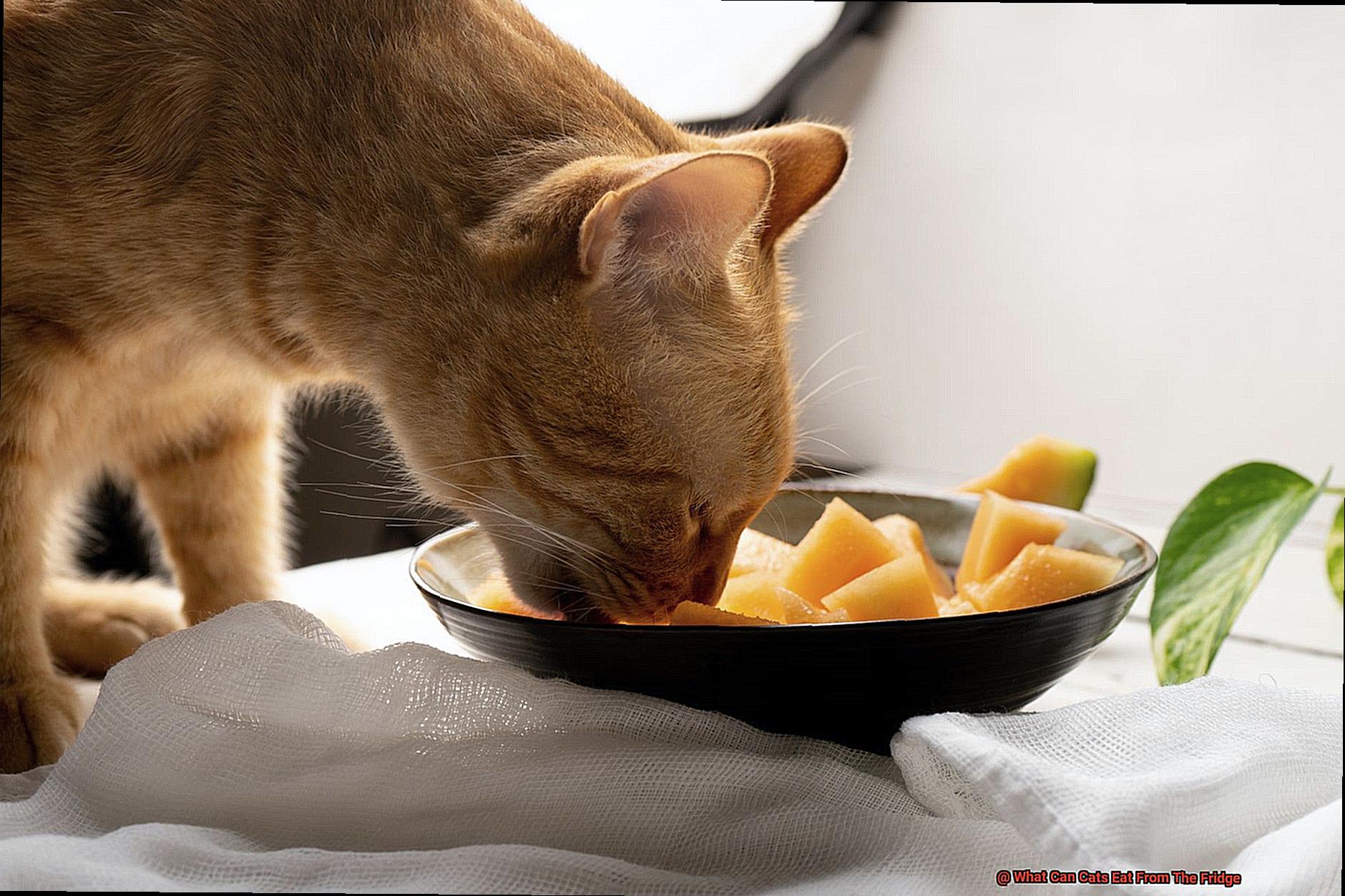
So what should you feed your cat instead? It’s always best to stick to a balanced commercial cat food diet that meets all of your cat’s dietary requirements.
If you want to give your cat a treat from the fridge, try carrots or green beans or fruit like watermelon or cantaloupe. Just make sure to remove any seeds or pits before serving.
Stick to a balanced commercial diet and only offer moderation treats.
6EXGq3xyAD4″ >
Tips for Feeding Your Cat Safely
However, feeding your cat from the fridge requires some precautions to ensure their safety and health. Here are 5 tips for feeding your cat safely:
Avoid toxic human foods
Some human foods are toxic to cats, such as chocolate, onions, garlic, grapes, raisins, and avocados. Keep these foods out of your cat’s reach and avoid feeding them to your cat at all costs. Stick to cat food and treats that are specifically designed for felines.
Check expiration dates
Always check the expiration dates of the food you’re feeding your cat. Expired food can cause illness or even food poisoning, so it’s important to make sure the food is still fresh before serving it to your cat.
Serve appropriate portions
Overfeeding your cat can lead to obesity and other health problems. Follow the feeding guidelines on the food packaging or consult with your veterinarian for appropriate portion sizes based on your cat’s age, weight, and activity level.
Store food properly
Proper storage of cat food is crucial to maintain its freshness and prevent contamination. Store dry cat food in airtight containers in a cool, dry place, and refrigerate or freeze wet cat food after opening. Don’t leave wet food out for too long as it can quickly spoil.
Clean dishes and utensils regularly
Regularly clean your cat’s dishes and utensils with hot, soapy water to prevent bacterial growth and contamination. This will ensure that your cat’s food is safe to eat every time.
Also Read: Can Cats Eat Cold Food? – 21Cats.org
Conclusion
In conclusion, the fridge can be a treasure trove of tasty and nutritious treats for your feline friend.
However, it’s crucial to keep in mind that cats have specific dietary needs, and not all human foods are suitable for them. As obligate carnivores, cats require a diet that meets their nutritional requirements.
Opt for lean meats like chicken and turkey as they are popular choices among cats. Processed meats should be avoided as they may contain additives that could harm your cat’s health.
While fish is also a great option, it should be given in moderation to prevent any potential health risks. Since many cats are lactose intolerant, dairy products can pose a challenge.
However, small amounts of lactose-free products like plain yogurt or cottage cheese can provide an excellent source of protein and calcium without causing digestive problems. Adding vegetables and fruits to your cat’s diet can also offer several health benefits.
But remember, not all produce is safe for feline consumption. So make sure you do proper research before introducing any new foods.
When feeding your cat from the fridge, ensure that you avoid toxic human foods at all costs, check expiration dates before serving food items, serve appropriate portions to prevent overfeeding or underfeeding, store food properly to maintain its freshness and cleanliness, and clean dishes regularly.







